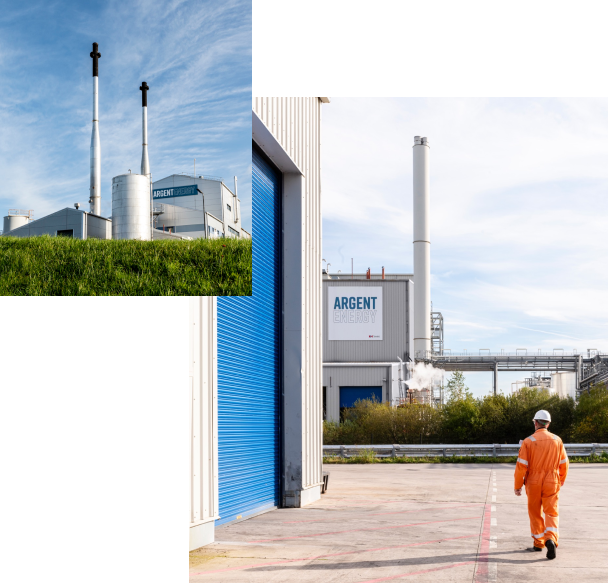The Argent Energy difference
 | Authentic We are respectful and transparent towards our customers and suppliers and pride ourselves on saying what we do and doing what we say. We use only certified waste as our feedstock, thereby supporting decarbonisation and promoting a circular economy. |
 | Responsive By being passionate in what we do, we work with all stakeholders and act towards market changes in a solution orientated way. |
 | Gutsy We strive to convert the most difficult wastes into fuel whilst being innovative and enterprising. We use cutting edge technology and aren’t afraid to develop new solutions. We like to partner with other companies which share our aims of using innovative technology including universities. |
 | Empowering We strive to empower anyone or any business which works with us or for us. We drive new solutions and think differently and hope this passion and empowerment influences others to do the same. |
 | Nurturing We like to nurture long term relationships both with our teams and partners, taking care of them to ensure a longer-lasting and stronger relationship. Business relationships are an integral part of professional success and we prioritise them. |
 | Thinking differently We create new ways of working through collaboration with technological partners who join us in being willing to think outside the box. Not only that, we want to work with people who listen to new ideas and solutions and find different ways of problem solving. |
Why is biofuel important?
What is biofuel and its benefits?
The two most common forms of biofuel are:
- biodiesel, a substitute for standard fossil-derived diesel
- ethanol, a substitute for petrol
Biofuels are manufactured from biomass, which is renewable organic material that comes from plants and animals.
The key advantage of biofuels is they utilise the carbon that is already in use on the surface of the planet, rather than the fossil carbon that was deposited in the form of oil under the surface over millions of years. Being renewable means biofuel use does not add to the amount of carbon being recycled through the atmosphere, and this in turn means they do not increase the net amount of greenhouse gases (GHG) that are affecting climate change.
Why do we need biofuels?
By using biofuels instead of fossil fuels we avoid increasing the carbon on the planet surface and in the atmosphere. While it is critical that energy usage is reduced wherever it can be, EU projections show that fossil fuels are going to be in use for some time. However, biofuels for Internal Combustion Engines provide good alternative to fossil fuels and guarantee high levels of decarbonisation.
What are the advantages and disadvantages?
Advantages:
- Huge savings of GHG emissions (around 90 percent better than the fossil diesel)
- Easily blended into standard diesel
- Can be used up to 20 – 30 percent blends (B30) all year round, without any need for modifications or changes to servicing routines
- Can be used in pure form (B100) all year round with an adaptation to lower temperature requirements
- Roughly as biodegradable as sugar
- Roughly as toxic as salt
- Higher cetane value gives better, more thorough burn properties
- Lower particulate emissions (no grey or black exhaust smoke)
- Lower carbon monoxide emissions
- Better fuel lubricity
- Can be delivered direct to truck and bus fleet operators that operate back-to-base refuelling
Disadvantages:
- The sources of wastes for biodiesel are limited. Despite that limit not being reached yet, there will not be enough to replace all the fossil diesel in transport. Fortunately, the use of biofuels is complemented by other technologies such as biomethane (for gas vehicles) and, in the future, renewable hydrogen and renewable electric vehicles.
How does waste-based biodiesel benefit the environment?
- Dramatically reduces global greenhouse gas emissions
- Reduces tailpipe emissions of particulates
- Reduces tailpipe emissions of carbon monoxide (CO)
Why are biofuels beneficial to society?
Manmade greenhouse gas emissions are widely accepted as the major cause of global warming and the consequent changes to our climate. If we are to have any chance of stopping global warming and saving millions of people from the potentially devastating impact of extreme climate events, the growing use of fossil-derived energy must be reversed. Every litre of renewable biofuels used in place of fossil diesel is a small step towards that goal. Given the fact that the transport sector in Europe is responsible for more than 25% of GHG emissions, decarbonisation of transport is perhaps the most important aspect of reducing the world’s carbon footprint. The use of waste-based biodiesel counters the use of fossil fuels while allowing society to continue to function. As we learn about and develop the means of achieving net zero emissions by 2050, the savings made now through the use of biofuels allows that ultimate target to be feasible.
How has Argent Energy already implemented successful biofuel business transformations?
You can see how we have already implemented successful biofuel business transformations in our Case Studies.
What does the future hold for biofuel?
In spite of progressing the electrification of road vehicles and the developments on the Hydrogen scene, studies show that biofuels have an important role to play for years to come.
While there might be alternatives for passenger cars and local delivery vans, long haul buses or trucks will continue to rely on biofuels for decarbonisation for some time to come. The same is true for transport beyond road such as marine and aviation, whose decarbonisation goals for the next decades will require an extensive use of biofuels.
Why are high fuel blends important?
Climate change and its devastating effects are at the forefront of everyone’s minds. Governments and policy makers globally are continually reviewing, updating and amending their roadmap to meet the ever-changing targets to reach net zero carbon emissions.
Whilst electrification may be the obvious answer for cars and vans, there is no immediate answer for heavy-duty vehicles (HDV). There are also many other things to consider when deciding on the optimum solution to decarbonise a fleet of HDVs such as up-front costs, retrofit costs, residual values, sustainability of fuel, security of supply, fuel cost, etc. Many fleet operators will continue to utilise diesel powered trucks for years to come and making the switch to high blend diesel, supplied by Argent Energy, is the easiest and quickest way to reduce your carbon emissions.
It has become common practice for contracts and tenders to include a clause that asks how a potential service provider will help the tenderer to reduce their carbon footprint. As part of the ZEMO Low Carbon Assurance Scheme, Argent Energy can validate the volumes of high blend diesel purchased in a period and certify the number of tonnes of carbon saved. This can satisfy shareholders, stakeholders, customers and your own Corporate Social Responsibility requirements.
To find out more about Argent’s range of decarbonising fuels please contact us
For more information on low carbon fuels see the Renewable Fuels Guide published by LowCVP (Now ZEMO Partnership).

